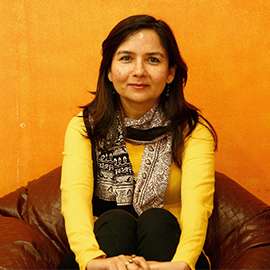Yesterday once more: Bohra spiritual head tells community to continue practicing female genital mutilation

When the United Nations declared February 6 as the International Day of Zero Tolerance to Female Genital Mutilation, the Dawoodi Bohra community in India saw hope.
Hope for the thousands of little Bohra girls who are circumcised much before they hit puberty and are scarred for life - literally and metaphorically.
In a cruel ritual, the tip of their clitoris is cut off -- with a blade or a razor - to curb their sexual desires. These little girls live in fear, pain and shame for the longest time, mostly on oath to not talk about this unscientific and clandestine procedure.
Unmindful of the world campaign against FGM, Syedna Mufaddal Saifuddin, the head of the close-knit Dawoodi Bohra community, dashed the hopes of Bohra women by exhorting the community to be strong and firm and to continue the practice of 'khatna' or female circumcision.
Also read - 30 female genital mutilation survivors push to end barbaric practice
"It must be done. If it is a man, it can be done openly and if it is a woman it must be discreet. But the act must be done. Do you understand what I am saying? Let people say what they want...but Rasoolullah [Prophet Mohammed] has said it...Rasoolullah will never say anything against humanity. He has only spoken [of] what is beneficial...from the perspective ["haisiyat"] of the body and the soul. What do they say?...that this is harmful? Let them, say it, we are not scared of anyone," the Syedna said in a speech in Mumbai last month.
However, earlier this week, Syedna Taher Fakhruddin of the Fatemi Dawat, a rival faction of the Dawoodi Bohra community, decided to support the ban on female circumcision - giving the crusading women of the community some reason to cheer.
Male vs Female Circumcision
The Dawoodi Bohra community is a small and prosperous Shia Muslim sect mostly based in western India.
The community is supposedly the most educated and prosperous among Muslims. Ironically, it is also the only community in the Islamic world that practices female circumcision or 'khatna', as they like to call it. Or Female Genital Mutilation - as the world knows it.
The sect owes its origin to the arrival of Shia Ismaili missionaries to the port of Cambay in the early 11th century AD from Egypt via Yemen. These missionaries found converts among Indian traders, largely in Gujarat, who came to be known as Bohras.
Islam does not endorse female circumcision. Yet young Bohra girls are subjected to this shame because some see it as an egalitarian practice.
Stand up, speak out
The 2-million strong Bohra community in India continues to violate the bodies of little girls as soon as they turn seven, sometimes earlier.
Sometime last year, a few brave Bohra women came together to launch Speak Out on FGM, even though there was a huge possibility of them being excommunicated by the community. Yet they decided to challenge the Syedna. Some, openly. Others, discreetly.
The forum launched an online petition that has been signed by more than 50,000 Bohras. It also wrote to the Syedna twice - asking him to end the practice of female circumcision as it causes enormous physical, psychological and emotional damage. The letters, not surprisingly, went unanswered, but through his speech the Syedna made his stance clear.
"Syedna's speech is a clear reference to khatna even though the word has not been used explicitly. He dismisses and derides all opposition to khatna being harmful. He tells Bohras it is their religious duty to practice it," says Masooma Ranalvi, who was herself subject to khatna when she turned seven.
Ranalvi's body was violated more than 40 years ago in Mumbai's Bhindi Bazaar. But the memory is fresh. The tip of her clitoris was cut off with a blade or razor and a black powder sprayed. What she does remember with clarity is the acute pain. And the lifelong shame.
"It is for the first time that women in this community have openly come out to speak about this secretive practice and have bared in public the ill-effects it has had on them. It is the duty of the religious leadership to hear the voices of its own followers and women and address their pleas," says Ranalvi.
"Many Bohra women argue that this practice is part of the egalitarian nature of their religion, as both men and women are circumcised," she says. But there is a vital difference.
For men the circumcision is done for health and hygiene reasons - a practice which has the sanction of science. Moreover, it is not done in secrecy or in a hush-hush manner. A boy's circumcision is celebrated, a girl's isn't.
Syedna vs Syedna
While Ranalvi found Syedna Mufaddal Saifuddin's speech disappointing and disheartening, she sees hope in Syedna Taher Fakhruddin's statement.
But she does not want the sensitivity of the issue to be lost in the larger politics of the Bohra community.
In a joint statement Speak Out on FGM and Sahiyo, another Bohra women's group that is anti-FGM, welcomed the support for the ban.
"There are various sects within the Bohras - Dawoodis, Sulemanis and Alvis. Within the Dawoodis there is a current power struggle going on, which does not concern us. Speak Out on FGM and Sahiyo have representation of Bohra women from all these sects and are exclusively concerned about the welfare of the girl child and women (they may belong to any sect, religion or region/country) and are opposed to FGM/FGC/Khatna on the girl child as it constitutes a severe human rights violation," says Ranalvi.
Sahiyo has also been actively campaigning against female circumcision.
In a post titled, "Respected Syedna, we are all disappointed by your views on female circumcision" - the organisation argues that the real opposition that the Syedna is trying to checkmate is not from developed nations such as the UK, US and Australia - but from within the community.
"The Syedna says that the 'the act' must be practiced because the Prophet recommended (it) as something beneficial. But according to the jamaat, letters issued with the sanction of the Syedna, the Prophet also preached the value of 'hibbul watan minal imam' - love and loyalty for the laws of one's country. So which teachings of the Prophet must Bohras in those countries follow?"
According to Sahiyo, the strongest form of opposition to FGM is from within the community - from Bohra women who have either undergone khatna or have seen their loved ones go through it, and from Bohra men who are horrified that their daughters, sisters, mothers and friends have "to go through the cut".
Both Speak Out on FGM and Sahiyo are clear that the clitoris dehooding procedure that Syedna Taher Fakhruddin backs is not a medical necessity.
A centuries-old practice aimed at curbing the sexuality of women has no place in the 21st century. About time Syedna Mufaddal Saifuddin and others, who support FGM, transport themselves into the present era and embrace modernity.
More in Catch - The horror of #FGM: Bohra community shames women by cutting genitals
First published: 13 May 2016, 3:10 IST






![BJP's Kapil Mishra recreates Shankar Mahadevan’s ‘Breathless’ song to highlight Delhi pollution [WATCH] BJP's Kapil Mishra recreates Shankar Mahadevan’s ‘Breathless’ song to highlight Delhi pollution [WATCH]](https://images.catchnews.com/upload/2022/11/03/kapil-mishra_240884_300x172.png)

![Anupam Kher shares pictures of his toned body on 67th birthday [MUST SEE] Anupam Kher shares pictures of his toned body on 67th birthday [MUST SEE]](https://images.catchnews.com/upload/2022/03/07/Anupam_kher_231145_300x172.jpg)






